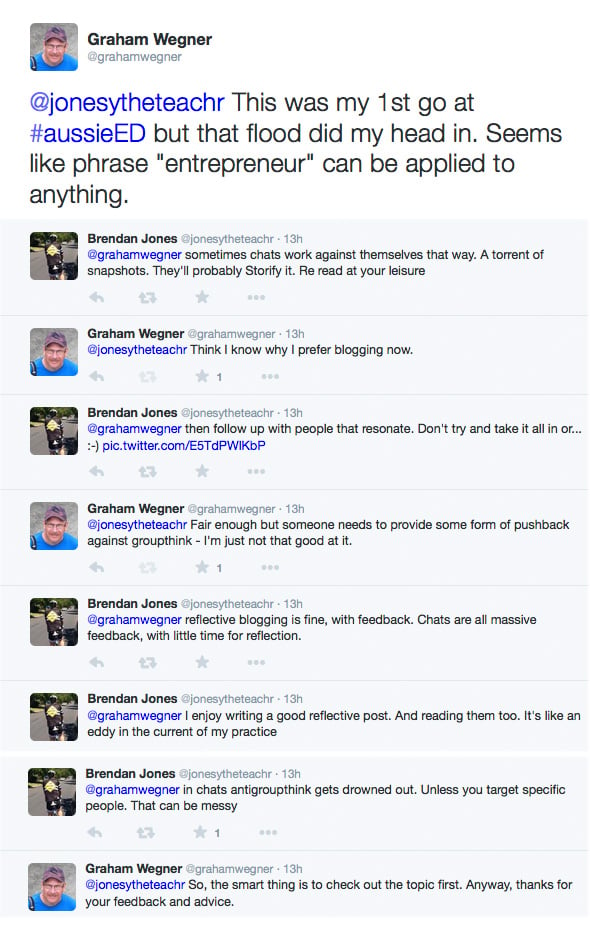I've been at Woodville Gardens School now for nearly four years in my role as Assistant Principal, and I have learnt a lot. The school, the community, my colleagues have all given me a greater appreciation of things on so many levels. Tonight I thought I would try and articulate a few of these.
A DigiTech TeachMeet was held tonight at my school. A bunch of educators keen on educational technology from mainly the western suburbs here in Adelaide gathered to share, enjoying the comfortable surrounds of our resource centre. Two of my colleagues shared about their practice - for the first time in front of others who weren't their immediate colleagues - and they were brilliant. Julie shared about her use of video making with Year 1 students in their History Inquiry and Kellie shared about her long term practice of Discovery Time which has elements of inquiry, technology and making all wrapped together with her Reception students. Seeing them both present so well gave me a greater appreciation of the high level of teachers we have at our school. Granted, these two are exemplary but the fact that what they talked about is as good as anything happening in any school in Australia made me proud to be their colleague.
This school has given me a greater appreciation for how tough some kids, even here in Australia, can have it and that our society still doesn't really know what to do about it. The media likes to come down hard on schools like ours for our NAPLAN results which don't match schools where everyone comes to class well fed, in clean clothes, with a full night's sleep, without memories of trauma or abuse and from a household with all of the amenities that modern life can provide. Some of our kids do pretty well considering that some have to go home to be substitute mothers or to be unpaid cleaners. Some of our kids have been speaking English for less than a couple of years and for some, school is the only place with comforting rules and safety and where the adults in charge have to speak nicely and listen to their point of view. It has made me very appreciative of how I can provide so much for my own kids and how really they want for very little.
I have a greater appreciation for other cultures and how difficult it must be to be in a place where all of the norms of your world that you grew up in are all out the window. At the same time, I can see how appreciative many of these parents of varying backgrounds are of the opportunity that education can open up for their children. I still enjoy the sight of seeing kids of varying backgrounds walk out of the school grounds deep in conversation with others talking about going to Vietnamese lessons, or what happens at the local mosque or their last trip up to the bush. End of term class parties are certainly a great mix of cuisines as home made spring rolls sit alongside samosas and Tim Tams.
I'm super appreciative of being part of a large leadership team. We all bring our individual strengths and talents to the table but we are pointed in the same direction. I've learnt stacks about multicultural families from my fellow AP, Anna. I've got a much deeper understanding of special needs students and the support required to make a difference from our coordinator, Dee. I've improved my restorative justice skills and "turning things around" conversations from watching our counselling team, Liz and Marek in action. The Heads of School, Ashley and Marg, who both have time to listen to me lay out my concerns and issues and offer their advice in moving forward. Add to that a hugely influential Principal, Frank (two weeks away from retiring) who has shown me the value of the big picture, and the difference that innovation can make in a place where conventional thinking and traditional ideas will be limited in their impact. I have a great appreciation of how much I learn from these people, my colleagues. I'm lucky to be a part of it all.
And when I get to play the role of host like tonight, it is nice to appreciate working in a facility that is less than five years old, where the technology is at a high level and where the kids who come from either complex or disadvantaged backgrounds get a place that they can be proud of, that is theirs.


